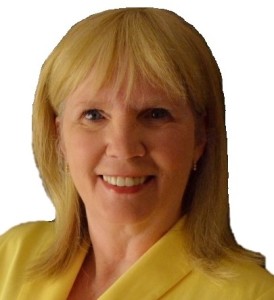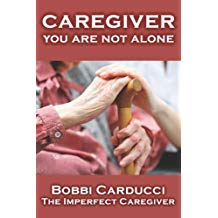This week I had the chance to chat with Bobbi Carducci. A few years ago, I read her book Confessions of an Imperfect Caregiver. When I bumped into her the other day, I saw she has a new book out, this one also related to caregiving. She agreed to answer some questions for today’s Writer Wednesday feature.
Her newest book, Caregiver You Are Not Alone, is an anthology of short stories depicting caregivers dealing with dementia behaviors and issues that are often difficult for family members to understand and respond to.
 What inspired you to focus on caregiving as a primary topic of your first book?
What inspired you to focus on caregiving as a primary topic of your first book?
I was an in-home caregiver for my father-in-law, Rodger, for seven years. He was schizophrenic, having spent thirteen years in mental hospitals as a young adult. He was released in 1960. Eventually he married and raised a family. After he came to live with us, upon my mother-in-law’s passing, he developed dementia, Parkinson’s disease, and severe swallowing problems, and other less traumatic health issues. He needed full time care.
During that time I began hearing from other caregivers through my blog and other social media. Many said they wished someone would write a book that expressed what it’s really like to care for someone with dementia. I decided to write our story and to tell it as honestly as I could. Confessions of an Imperfect Caregiver, has been called brutally honest and anyone who reads it will come to know my family very well. I hope they will come to understand how difficult and stressful being a family caregiver can be and how it can also lead to the sharing of precious moments of clarity and personal growth. I call it creative problem solving on the run and see him as the most important teacher I ever had.
Who would be a target reader for a book about caregiving?
I thought I was writing it for other caregivers who longed to know that others had a hard time doing this. I shared the moments when I was far from my best self as well as the funny, heartwarming moments which were more rare but deeply appreciated. I now know the book is often shared with family members of caregivers to help them understand what the caregiver in their family may be facing every day. I wrote it to read like a novel but every word is true. Because of that, it is also read by women and men who enjoy reading about real families coping with difficult issues.
Tell us about your newest book.
The newest book, Caregiver You Are Not Alone, is an anthology of short stories depicting caregivers dealing with dementia behaviors and issues that are often difficult for family members to understand and respond to. Almost daily on caregiver social media sites and blogs and during caregiver support groups meetings, caregivers ask many of the same questions. Is this normal? Does anyone else deal with this or that behavior and what do you do when it occurs? Each story in the book depicts a caregiver who needs help in some way. Caregivers depicted are women and men of varying ages. Some are caring for parents, others for a spouse, child, or other family member. Each story is followed by a response taken from one of my previously written blog posts.
Caregivers are often isolated and have a need to know that others feel as they do. Especially when they think they are failing in some way. I hope that through my writing I am able to help caregivers understand that none of us are perfect and sometimes being a little bit crazy is exactly what’s called for. Even on the worst days we carry on as best we can.
I understand there were some “challenging” circumstances regarding the writing of your second book… care to share?
 Yes, challenging is the right word for how this book came to be. The acquisitions editor of S&H Publishing had read my blog posts and suggested more than once that I turn some of them into a book. I liked the idea but it kept being put on the back burner as life and other commitments demanded my attention.
Yes, challenging is the right word for how this book came to be. The acquisitions editor of S&H Publishing had read my blog posts and suggested more than once that I turn some of them into a book. I liked the idea but it kept being put on the back burner as life and other commitments demanded my attention.
Just before I approached the publisher to ask if she was still interested in doing the book I was invited to be a presenter at the National Caregiver Conference in Chicago in October 2018. It seemed to me that the timing was right for the new book. The publisher agreed and asked if I could get it done in time to be published and have it available at the conference. After selecting the posts to work with, we realized that meant writing almost fifty short stories in a month. I agreed to try my best.
It was quite a task. It really challenged my creativity and it resulted in a few major headaches and a panic attack but I got it done in time to be edited and published. I enjoyed the challenge but if I do anything like that again more time to would definitely be appreciated. The message the stories send to caregivers I feel is most important. We are not alone. We are an army of individuals dealing with one of the most important, fastest growing issues, of our day. We are here for one another.
Since your first book was published, you’ve made a splash in the world of caregiving. What are some of your most memorable experiences?
When caregivers reach out to tell me I have helped them in some small way means everything to me. I developed a workshop titled, Prepare to Care – What Adults Need to Know About Alzheimer’s Before and After It Strikes Home. I designed it for those in their thirties and forties who may not know what is coming their way in the next ten to fifteen years.
Being a keynote speaker at a caregiver conference in Virginia and participating as a presenter at the National Caregiver Conference in Chicago where I also sat on two panels are not only opportunities to teach people about these issues but also to learn from them.
Aside from caregiving, what do you enjoy writing?
I love writing short stories and I’m pleased to have some of them published in anthologies including Chicken Soup for Soul, Short and Happy (or Not), Abundant Grace, and Cup of Comfort. I also write occasionally for newspapers and magazines, primarily about dementia topics.
What advice would you give to caregivers or those who might soon become a caregiver?
Prepare now, before the need is critical. Learn as much as you can about these devastating brain diseases and how they can affect not just the one needing care and the caregiver, but the entire family. Attend caregiver conferences in your area. If unable to do that, go to the Alzheimer’s website. There is invaluable information to be found there. www.alz.org
Anything you wish I had asked?
No. Thank you for the opportunity to share here.
You can find out more about Bobbi at www.bobbicarducci.com and www.theimperfectcaregiver.com. Twitter: @Bobbicarducci2
Facebook: https://www.facebook.com/bobbi.carducci